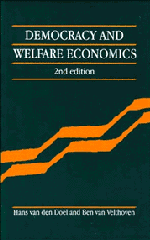3 - Negotiation
Published online by Cambridge University Press: 03 May 2011
Summary
Freedom of exit and non-commitment
In chapter 2, we considered the conditions for a social welfare optimum. We formulated this welfare optimum from the point of view of a philosopher-king who stands outside the economic and political process and who wants the best for his subjects. We stated that with regard to private goods and services, one can, in principle, rely on the market mechanism for realising an optimum. With regard to public goods, we have not yet answered whether an optimum is attainable in social reality, and if so, under which circumstances. This topic will be discussed in chapters 3 to 6.
In this chapter on negotiations democracy, we shall consider whether groups in which the members negotiate with each other on the basis of freedom of exit and non-commitment, are able to establish the particular policy that is optimal for the joint welfare of the citizens in that group. It is important to reflect on groups because every collective action takes place by or on behalf of a group, and a system of purely individual transactions in a free market has not – in general – been suitable for the delivery of public goods. Freedom of exit (voluntarism) means that the members are free to leave the group. Non-commitment means that group decisions are not binding for the individual group members. Examples of groups which are more or less organised on the basis of freedom of exit and non-commitment are interest groups, trade unions, military alliances (e.g. NATO in peace time) and international organisations (the United Nations).
- Type
- Chapter
- Information
- Democracy and Welfare Economics , pp. 47 - 86Publisher: Cambridge University PressPrint publication year: 1993



